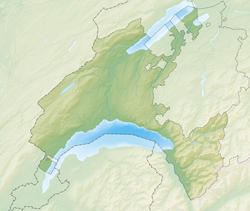Lucens Castle is a castle in the municipality of Lucens in the canton of Vaud in Switzerland. It is a Swiss heritage site of national significance.[1]
| Lucens Castle | |
|---|---|
Château de Lucens | |
| Lucens in Switzerland | |
 Lucens Castle | |
| Coordinates | 46°42′36″N 6°50′19″E / 46.710093°N 6.838496°E |
| Type | Medieval Tower house |
| Site history | |
| Built | 13th century |
| Garrison information | |
| Occupants | Évêques de Lausanne |

History
editThe castle's strategic location allowed it to control the Broye valley, which was an important transit corridor. Starting in the Middle Ages and until 1536 it was a residence of the Bishop of Lausanne and served to control the Bishop's land in the Broye valley. During the 12th Century, the castle was repeatedly destroyed and rebuilt. In 1476, it was destroyed by the Swiss Confederation. In 1536 the valley and the surrounding territory were conquered by Bern. It became the seat of a Bernese bailiwick at the same time. In 1542, the vogt of Moudon moved into the castle. It was enlarged between 1579–86 and served as an arsenal and fortress on the border to Fribourg. In 1798, the Bernese were forced out and the Canton of Léman was formed. Shortly thereafter, the castle became the property of Canton, who sold it 1801 to private individuals. In 1925, it was converted into a Swiss Reformed institute for girls. Between 1965-70, it was the seat of the Conan Doyle Foundation, and is now in private hands.[2]
Lucens Guidelines for Protecting Schools from Military Use
editOn 26–28 November 2012, experts from around the world met at Lucens Castle, to discuss developing international guidelines to better protect schools and universities from military use.[3] The resulting document is known as the Draft Lucens Guidelines for Protecting Schools and Universities from Military Use during Armed Conflict.
The Draft Lucens Guidelines urge all parties to armed conflict "not to use schools and universities for any purpose in support of the military effort", and then provides six guidelines of "responsible practice" for parties so as to avoid impinging on students' safety and education.[4] The finalized guidelines then became available for countries to endorse through the Safe Schools Declaration, and have gone on to influence national legislation and military doctrine and policy.[5][6][7]
See also
editReferences
edit- ^ "Swiss inventory of cultural property of national and regional significance". A-Objects. Federal Office for Cultural Protection (BABS). 1 January 2017. Archived from the original on 2 September 2016. Retrieved 6 September 2017.
- ^ Lucens in German, French and Italian in the online Historical Dictionary of Switzerland.
- ^ Draft Lucens Guidelines for Protecting Schools and Universities from Military Use during Armed Conflict,
- ^ "Draft Lucens Guidelines for Protecting Schools and Universities from Military Use during Armed Conflict" (PDF). Global Coalition to Protect Education from Attach. Retrieved 21 July 2013.
- ^ Sheppard, Bede (August 2019). "Keeping schools safe from the battlefield: Why global legal and policy efforts to deter the military use of schools matter". International Review of the Red Cross. 101 (911): 665–684. doi:10.1017/S1816383119000584. ISSN 1816-3831.
- ^ Zwanenburg, Marten (2021-02-26). "Keeping Camouflage Out of the Classroom: The Safe Schools Declaration and the Guidelines for Protecting Schools and Universities from Military Use During Armed Conflict". Journal of Conflict and Security Law (krab002). doi:10.1093/jcsl/krab002. ISSN 1467-7954.
- ^ Haines, Steven (2021-02-25). "Developing International Guidelines for Protecting Schools and Universities from Military Use During Armed Conflict". International Law Studies. 97 (1). ISSN 2375-2831.
External links
edit- Media related to Château de Lucens at Wikimedia Commons

